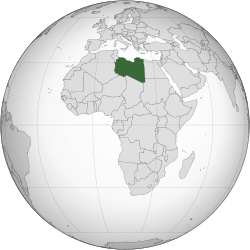Libya under Gaddafi
| Libyan Arab Republic | ||||||||||
| الجمهورية العربية الليبية Al-Jumhūrīyah Al-ʿArabiyyah Al-Lībiyyah (Arabic) Repubblica Araba Libica (Italian) |
||||||||||
|
||||||||||
|
||||||||||
|
Anthem الله أكبر Allahu Akbar God is the Greatest |
||||||||||
| Capital | Tripoli | |||||||||
| Languages |
Arabic Italian |
|||||||||
| Government | One-party state under military dictatorship | |||||||||
| Chairman of the Revolutionary Command Council | ||||||||||
| • | 1969–1977 | Muammar Gaddafi | ||||||||
| Historical era | Cold War | |||||||||
| • | Coup d'état | 1 September 1969 | ||||||||
| • | Jamahiriya established | 2 March 1977 | ||||||||
| Population | ||||||||||
| • | 1977 est. | 2,681,900 | ||||||||
| Currency | Libyan dinar | |||||||||
|
||||||||||
| Great Socialist People's Libyan Arab Jamahiriya | ||||||||||
|
الجماهيرية العربية الليبية الشعبية الإشتراكية العظمى al-Jamāhīrīyah al-‘Arabīyah al-Lībīyah ash-Sha‘bīyah al-Ishtirākīyah al-‘Uẓmá |
||||||||||
|
||||||||||
|
||||||||||
|
Anthem الله أكبر "Allahu Akbar" (English: "God is Great") |
||||||||||
| Capital |
Tripoli (1977–2011) Sirte (2011) |
|||||||||
| Languages | Arabic | |||||||||
| Religion | Islam | |||||||||
| Government | Unitary Islamic socialist Jamahiriya dictatorship | |||||||||
| Brotherly Leader and Guide of the Revolution | ||||||||||
| • | 1977–2011 | Muammar Gaddafi | ||||||||
| Historical era | Cold War · War on Terror | |||||||||
| • | People's Authority | 2 March 1977 | ||||||||
| • | Fall of Tripoli | 28 August 2011 | ||||||||
| • | Gaddafi killed | 20 October 2011 | ||||||||
| Population | ||||||||||
| • | 2010 est. | 6,355,100 | ||||||||
| Currency | Libyan dinar | |||||||||
|
||||||||||
Muammar Gaddafi became the de facto leader of Libya on 1 September 1969 after leading a group of young Libyan military officers against King Idris I in a bloodless coup d'état. After the king had fled the country, the Libyan Revolutionary Command Council (RCC) headed by Gaddafi abolished the monarchy and the old constitution and established the Libyan Arab Republic, with the motto "freedom, socialism, and unity".
After coming to power, the RCC government initiated a process of directing funds toward providing education, health care and housing for all. Public education in the country became free and primary education compulsory for both sexes. Medical care became available to the public at no cost but providing housing for all was a task the RCC government was not able to complete. Under Gaddafi, per capita income in the country rose to more than US $11,000, the fifth highest in Africa, but was highly stratified and concentrated within elite ranks loyal to Gaddafi. The increase in prosperity was accompanied by a controversial foreign policy, and there was increased political repression at home.
During the 1980s and 1990s, Gaddafi, in alliance with the Eastern Bloc and Fidel Castro's Cuba, openly supported rebel movements like Nelson Mandela's African National Congress, the Palestine Liberation Organization, the Irish Republican Army and the Polisario Front (Western Sahara). Gaddafi's government was either known to be or suspected of participating in or aiding terrorist acts by these and other proxy forces. Additionally, Gaddafi undertook several invasions of neighboring states in Africa, notably Chad in the 1970s and 1980s. All of his actions led to a deterioration of Libya's foreign relations with several countries, especially Western states, and culminated in the US bombing of Libya in 1986. Gaddafi defended his government's actions by citing the need to support anti-imperialist and anti-colonial movements around the world. Notably, Gaddafi supported anti-Zionist, pan-Africanist, and black civil rights movements. Gaddafi's behavior, often erratic, led outsiders to conclude that he was not mentally sound, a claim disputed by the Libyan authorities and other observers close to Gaddafi. Despite receiving extensive aid and technical assistance from the Soviet Union and its allies, Gaddafi retained close ties to pro-American governments in Western Europe, largely by bribing Western oil companies with promises of access to lucrative Libyan energy sectors. After the 9/11 attacks, strained relations between Libya and the West were mostly normalised, and sanctions against the country relaxed, in exchange for Libyan efforts to shrink its nuclear program.
...
Wikipedia





